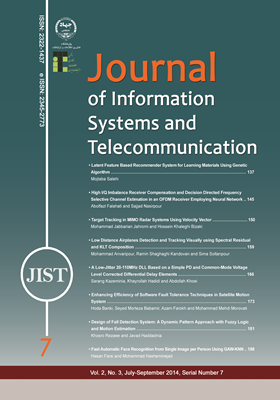Target Tracking in MIMO Radar Systems Using Velocity Vector
محورهای موضوعی : Communication Systems & DevicesMohammad Jabbarian Jahromi 1 , Hossein Khaleghi Bizaki 2
1 - Malek Ashtar University of Technology
2 - Malek Ashtar University of Technology
کلید واژه: MIMO Radar, Continuous Wave Radar, Pulse-Doppler Radar, Extended Kalman Filter, Target Tracking, Velocity Vector,
چکیده مقاله :
The superiority of multiple-input multiple-output (MIMO) radars over conventional radars has been recently shown in many aspects. These radars consist of many transmitters and receivers located far from each other. In this scenario, the MIMO radar is able to observe the targets from different directions. One of the advantages of these radars is exploitation of Doppler frequencies from different transmitter-target-receiver paths. The extracted Doppler frequencies can be used for estimation of target velocity vector so that, the radar can be able to track the targets by use of its velocity vector with reasonable accuracy. In this paper, two different processing systems are considered for MIMO radars. First one is the pulse Doppler system, and the second one is continuous wave (CW) system without range processing. The measurement of the velocity vector of the target and its counterpart errors are taken into account. Also, the extended Kalman target tracking by using its velocity vector is considered. Besides, its performance is compared with those of MIMO target tracking without using the velocity vector and conventional radars. The simulation results show that the MIMO radars using velocity vector have superior performance over other above-mentioned radars in fast maneuvering target tracking. Since the range processing is ignored in CW MIMO radar systems, the complexity of this system is much lower than that of Pulse Doppler MIMO radar system, but has lower performance in tracking fast maneuvering target.
The superiority of multiple-input multiple-output (MIMO) radars over conventional radars has been recently shown in many aspects. These radars consist of many transmitters and receivers located far from each other. In this scenario, the MIMO radar is able to observe the targets from different directions. One of the advantages of these radars is exploitation of Doppler frequencies from different transmitter-target-receiver paths. The extracted Doppler frequencies can be used for estimation of target velocity vector so that, the radar can be able to track the targets by use of its velocity vector with reasonable accuracy. In this paper, two different processing systems are considered for MIMO radars. First one is the pulse Doppler system, and the second one is continuous wave (CW) system without range processing. The measurement of the velocity vector of the target and its counterpart errors are taken into account. Also, the extended Kalman target tracking by using its velocity vector is considered. Besides, its performance is compared with those of MIMO target tracking without using the velocity vector and conventional radars. The simulation results show that the MIMO radars using velocity vector have superior performance over other above-mentioned radars in fast maneuvering target tracking. Since the range processing is ignored in CW MIMO radar systems, the complexity of this system is much lower than that of Pulse Doppler MIMO radar system, but has lower performance in tracking fast maneuvering target.


